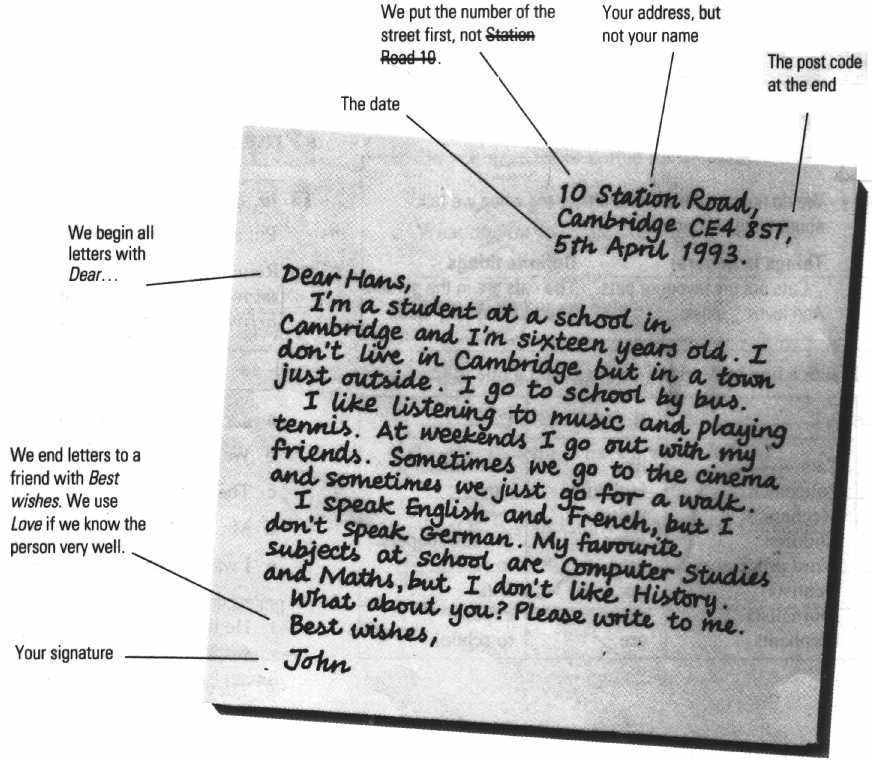Lessons 1-2 nice to meet you
| Вид материала | Документы |
| 2 Listen to the conversations and write the answers to the questions. 3 Compare your answers with your partner. Now listen again and check. |
- Семинара Тема доклада, 26.24kb.
- Семинара Тема доклада, 24.57kb.
- Задания, оцениваемые в 2 балла, 51.19kb.
- Real Life People Who Followed The Rich Dad Lessons by Robert, T. Kiyosaki with Sharon, 3000.68kb.
- Следующие вопросы, 56.82kb.
- Следующие вопросы, 61.99kb.
- М. В. Ломоносова Филологический факультет Кафедра истории зарубежной литературы Диплом, 3721.87kb.
- Следующие вопросы: формирование новых рынков инновационной продукции: проектные решения;, 62.08kb.
HOW TO WRITE AN INFORMAL LETTER
R
E
ead the personal letter below. Study its structure and label the components.

D
A
B
C
_
F
G
___ signature ____ addressing ____ the postcode
____ the date ____ the number of the building ____ final polite phrase___
____ your address
LESSONS 5 – 6
Get ready for your writing Test 1. Use evaluation exercises to find out how much progress you have made in Lessons 1 – 4.
LESSON 7
AT UNIVERSITY
VOCABULARY AND LISTENING
LISTENING 1
Listen to Rob and Maggie talking about their studying. Insert R if the information is about Rob and M if it's about Maggie.
-
- .… studies languages.
- … comes from Australia.
- … lives in a castle.
- … knows Italian.
- … combines studying and job.
- … is a third-year student.
- .… studies languages.
LISTENING 2
1 You are going to listen to some conversations. Look at the words in the box and guess what the speakers will talk about.
Academic vocational freshman administration sophomore
license faculty advisor degree junior senior adult education major/minor electives core courses cumulative grade point average
2 Listen to the conversations and write the answers to the questions.
Conversation 1:
- What do we call a student who has just started high school or college?
________________________________________________________
- What are second, third, and fourth year students called?
________________________________________________________
Conversation 2:
- What do students receive at the end of their studies?
________________________________________________________
Conversation 3:
- What are the teachers of a school called?
_______________________________________________________
- Who ranks higher than teachers in a school?
_______________________________________________________
- What is the special teacher who is assigned to help each student called?
_______________________________________________________
Conversation 4:
- What kind of schools are colleges and universities?
_______________________________________________________
- What other kinds of schools are there?
_______________________________________________________
Conversation 5:
- What are the courses like math, science, and English that all students have to take called?
_______________________________________________________
- What are the courses that students can choose called?
_______________________________________________________
Conversation 6:
- What are the subjects a student emphasizes most and second most in college called?
_______________________________________________________
Conversation 7:
- What do the letters GPA stand for?
_______________________________________________________
3 Compare your answers with your partner. Now listen again and check.
FOR FUN
There are as many different ways of learning a language as there are language learners. However, it is possible to identify four main types. The purpose of this questionnaire is to help you identify which type you are most like and also to help you think about other ways of learning you might want to try.
WHAT LANGUAGE LEARNING TYPE ARE YOU?
| 1 Are you someone who
2 When you are reading, do you usually .
3 When you are speaking, do you.
| 4 For you a word usually has
5 Are you more interested in
6 Are you more interested in
|
7 Do you listen more to
a ) someone's exact words?
b) the sound of their voice?
If you chose more (a)s than (b)s, do the A questions.
If you chose more (b)s than (a)s, do the B questions.
